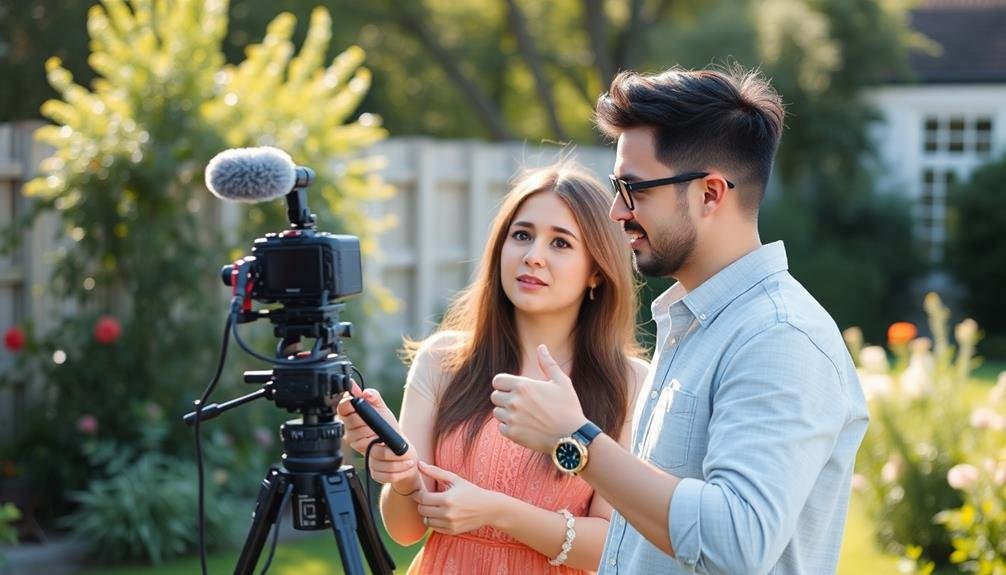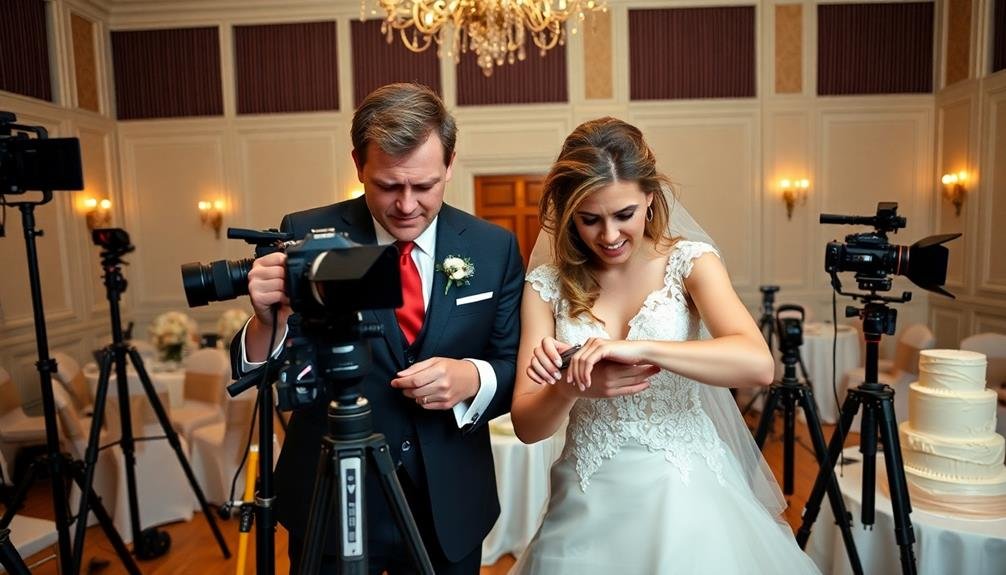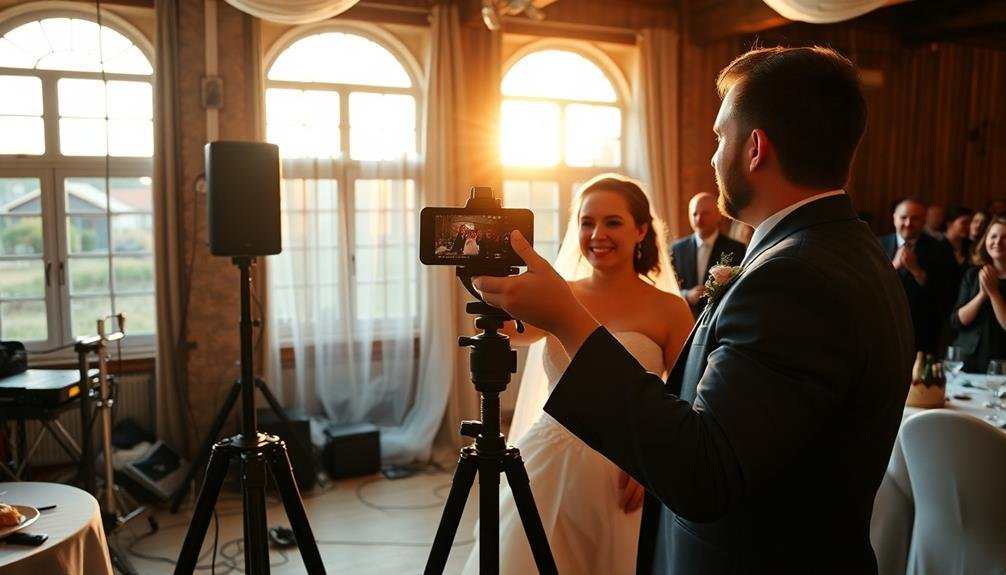DIY wedding videography can save you money and give you creative control, but it's not without challenges. You'll need professional-grade equipment, including cameras, audio gear, and stabilizers, which can be costly. Technical skills are essential: you must master camera settings, composition, audio recording, and editing. On your big day, time management becomes critical, requiring careful planning and coordination. While DIY offers a personal touch, it can be stressful and time-consuming. Consider alternatives like hiring a pro, enlisting a skilled friend, or exploring hybrid approaches. Weighing the pros and cons will help you decide if DIY is right for your special day.
Key Takeaways
- DIY wedding videography offers cost savings and creative control but requires significant equipment investment and technical skills.
- Capturing quality audio and achieving smooth, stabilized footage are major challenges for amateur videographers.
- Time management is crucial, balancing filming responsibilities with enjoying your own wedding day.
- Post-production editing demands considerable time and skill to create a cohesive, professional-looking final product.
- Alternative options like hiring professionals or utilizing skilled friends can mitigate risks while maintaining personal touch.
The Appeal of DIY Videography

Why are more couples opting for DIY wedding videography? The appeal lies in several factors that make it an attractive option for budget-conscious or creatively inclined couples.
First, there's the cost-saving aspect. Professional wedding videography can be expensive, often costing thousands of dollars. By taking on the task yourself or enlisting the help of friends and family, you can greatly reduce this expense.
DIY videography also offers greater creative control. You're not bound by a videographer's style or vision; instead, you can capture the moments that matter most to you in exactly the way you want. This personalized approach can result in a more intimate and meaningful wedding video.
Additionally, modern technology has made high-quality video equipment more accessible and user-friendly. With smartphones capable of shooting in 4K and affordable DSLR cameras, you don't need professional gear to achieve good results.
Lastly, the DIY approach can be less intrusive. Some couples feel more comfortable and natural when filmed by someone they know, rather than a stranger with a large camera setup.
Equipment Challenges and Considerations

Three major equipment challenges face couples evaluating DIY wedding videography.
First, you'll need to invest in quality cameras capable of capturing high-resolution footage in various lighting conditions. Professional-grade cameras can be expensive, and you'll likely need multiple units to cover different angles.
Second, audio recording presents a significant hurdle. Clear sound is vital for wedding videos, but most built-in camera microphones won't cut it. You'll need to purchase separate audio equipment, such as lavalier mics for the couple and shotgun mics for ambient sound.
Lastly, stabilization gear is essential for smooth, professional-looking footage. Tripods, monopods, and gimbals can help, but they require practice to use effectively.
You'll also need to evaluate storage solutions for the large amount of data you'll generate, as well as editing software and a powerful computer to process the footage.
These equipment challenges aren't insurmountable, but they require careful planning and budgeting.
You'll need to weigh the costs against hiring a professional videographer and decide if the investment in gear and time is worth it for your DIY wedding video.
Technical Skills Required

Beyond equipment challenges, mastering the necessary technical skills presents another hurdle for DIY wedding videographers.
You'll need to understand camera settings, including aperture, shutter speed, and ISO, to capture high-quality footage in various lighting conditions. Mastering manual focus is essential for maintaining sharp images, especially during unpredictable moments.
Composition skills are important for framing shots effectively. You'll need to learn about the rule of thirds, leading lines, and depth of field to create visually appealing footage.
Audio recording techniques are equally important; you must know how to use external microphones and manage sound levels to capture clear audio.
Post-production skills are significant for creating a polished final product. You'll need to learn video editing software to arrange clips, add changes, and color grade your footage.
Understanding basic color theory and correction techniques will help you achieve a consistent look throughout your video.
Lastly, storytelling skills are essential. You must learn to piece together coherent narratives from hours of footage, selecting the most impactful moments and weaving them into a compelling story that captures the essence of the wedding day.
Time Management on Your Day

On the wedding day, effective time management becomes essential for DIY videographers. You'll need to balance capturing key moments with setting up equipment and shifting between locations.
Create a detailed shot list and timeline beforehand, prioritizing must-have scenes like the ceremony and first dance.
Arrive early to scout locations and set up your gear. You'll want to be ready well before guests arrive.
During the ceremony, position yourself strategically to capture multiple angles without disrupting the proceedings. Be prepared to move quickly among shots, especially during fast-paced moments like the reception entrance or bouquet toss.
Don't forget to factor in time for adjusting camera settings, changing batteries, and swapping memory cards.
You'll also need breaks to rest and rehydrate, so plan accordingly. Coordinate with the wedding planner or coordinator to stay informed about schedule changes.
Alternative Options to Consider

While DIY wedding videography can be rewarding, it's important to contemplate alternative options that might better suit your needs or situation.
Consider hiring a professional videographer, which guarantees high-quality footage and allows you to fully enjoy your day without worrying about equipment or filming.
Another option is to enlist the help of a skilled friend or family member who's experience with videography. This can provide a more personal touch while still maintaining quality.
You might also explore crowdsourced videography, where guests contribute clips using their smartphones. Apps and services can help compile these into a cohesive video.
Alternatively, consider a hybrid approach, combining professional services for key moments with DIY elements for a personalized touch.
If videography isn't a top priority, you could opt for a photo slideshow set to music or a live-streaming service for remote guests.
These alternatives can capture the essence of your day without the complexity of full video production.
Frequently Asked Questions
Can I Edit My DIY Wedding Video on a Smartphone?
You can edit your DIY wedding video on a smartphone. Many apps offer basic editing features, but you'll face limitations in processing power and screen size. It's doable, but you might find it challenging for longer, complex videos.
How Do I Handle Audio for Outdoor Wedding Ceremonies?
For outdoor wedding ceremonies, you'll want to use lavalier microphones on the couple and officiant. Place a shotgun mic on your camera for ambient sound. Don't forget windscreens to reduce noise. Consider a backup recorder for safety.
What's the Ideal Length for a Wedding Highlight Video?
You'll want to aim for a wedding highlight video between 3-5 minutes long. It's short enough to keep viewers engaged but long enough to capture key moments. Remember, you're telling a story, not documenting every detail.
Should I Include Guest Interviews in My DIY Wedding Video?
You should consider including guest interviews in your wedding video. They add personal touches and capture memorable moments. However, be selective and keep them brief. Don't let interviews overshadow key wedding events or make the video too long.
How Can I Safely Store and Back up My Raw Wedding Footage?
To safely store your raw wedding footage, you'll want to use multiple backup methods. Save copies on external hard drives, cloud storage services, and even create physical DVDs. Don't forget to label everything clearly for easy access later.
In Summary
You've seen the ups and downs of DIY wedding videography. It's tempting to save money, but you'll face equipment hurdles, need technical know-how, and struggle with time management on your big day. Before committing, weigh the pros and cons carefully. Consider alternatives like hiring a professional or enlisting a skilled friend. Whatever you choose, remember that your wedding video is a lifelong keepsake. Make certain you're confident in your decision to guarantee you'll cherish the results for years to come.

I’m Sarah, the creator and writer behind this site. I’m a wife and a mother of two wonderful kids who keep me on my toes and inspire me daily. My passion lies in creating and organizing memorable events and group activities, where people can come together and make lasting memories.





Leave a Reply